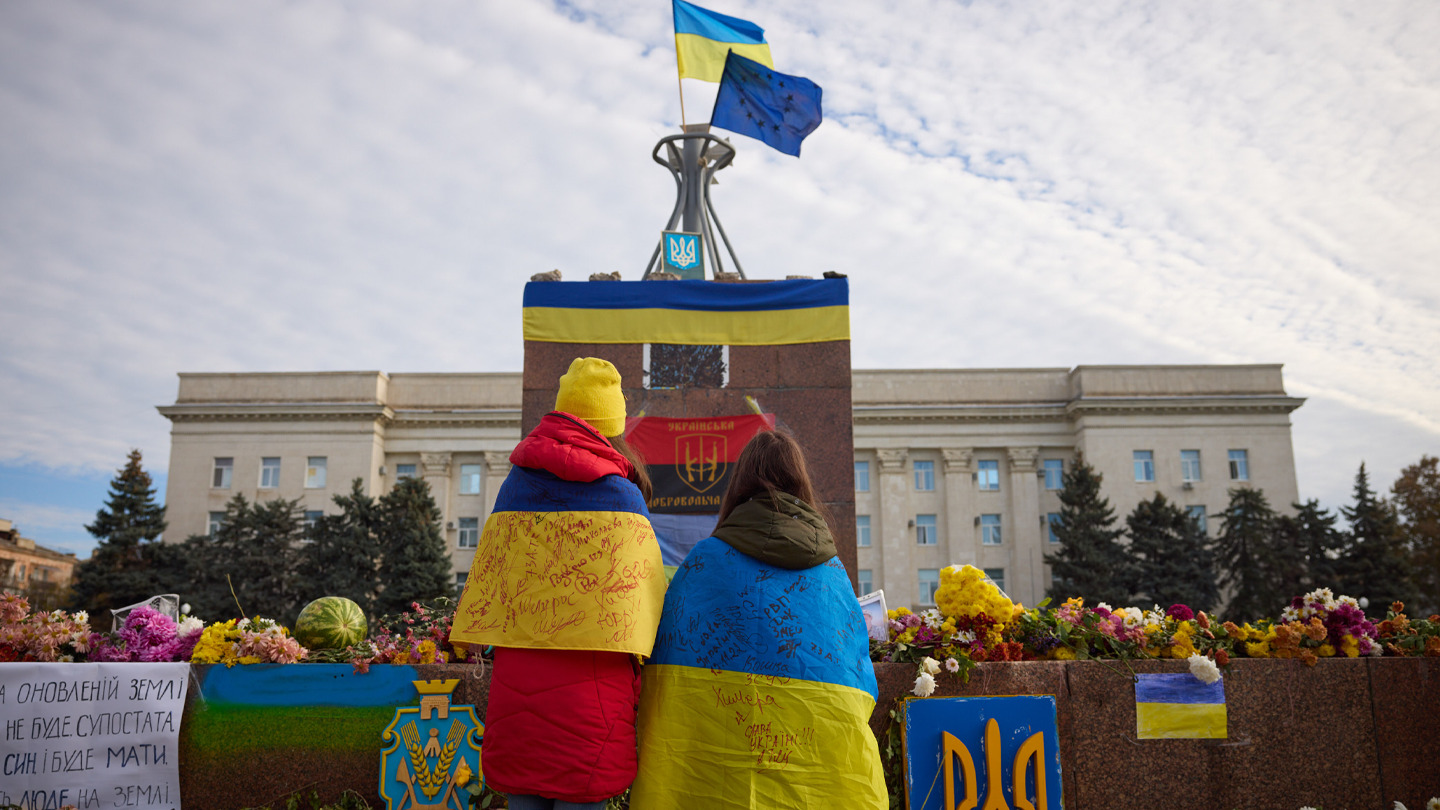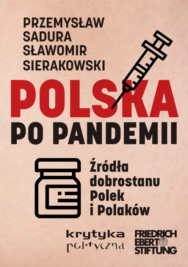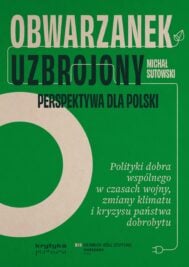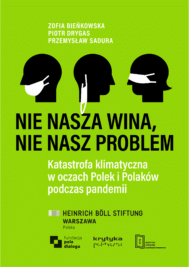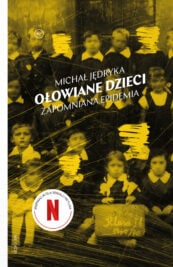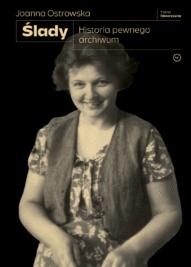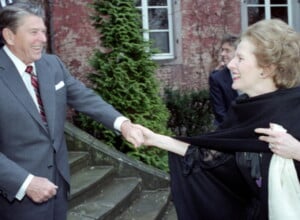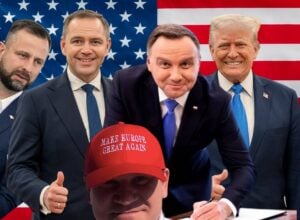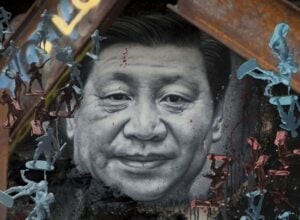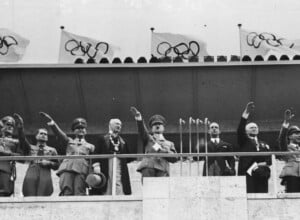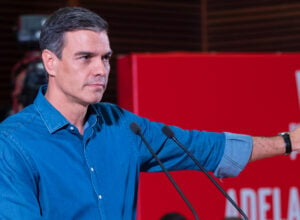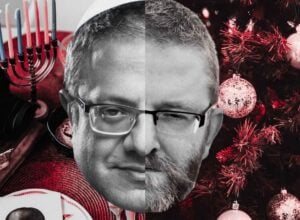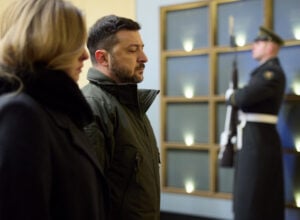Ja i Artur, mój kumpel, już od jakiegoś czasu nie mieliśmy wątpliwości, że trzeba nam jechać do Ukrainy. Odwiedzić starych znajomych i przekonać się, jak żyją z tą całą wojną. Posłuchać, co mają do powiedzenia, a potem powtarzać to na zachodzie Europy.
Zarezerwowaliśmy hotel i bilety na czwarty weekend sierpnia. Jak się okazało, dokładnie w ukraińskie Święto Niepodległości. To, co wcześniej było trzygodzinnym lotem z Berlina do Kijowa, teraz stało się już epopeją na półtorej doby, bo przestrzeń powietrzna nad Ukrainą jest zamknięta. Balice, Przemyśl, potem cała noc w pociągu.
Z dwunastego piętra Hotelu Ukraina przy kijowskim Majdanie rozciąga się imponujący widok na całe śródmieście. Nie widać żadnych zniszczeń. Ludzi na ulicach także nie ma zbyt wielu, może przez trwającą falę upałów. Przy parku Szewczenki spotykamy się z Serhijem.
– Druże! Jak sprawy? – popisuję się swoim ukraińskim.
– Dobrze – śmieje się Serhij. – Obie nogi. Obie ręce.
Swego czasu przymierzał się do studiów w Katowicach, dzięki czemu dalej możemy już rozmawiać po polsku. Prowadzi mały hostel w centrum miasta, w którym nocowałem podczas mojej poprzedniej wizyty w Ukrainie, jeszcze przed wojną.
Wypytuję o jego znajomych, których wtedy poznałem: wszyscy są cali i zdrowi. Paru poszło na front jako ochotnicy, choć były też przymusowe werbunki i łapanki.
– Jak zgłosisz się na ochotnika, to masz dużo lepszy układ: trzy tygodnie na froncie, trzy tygodnie w domu. Nie musisz porzucać normalnego życia.
Obecnie Serhij zajmuje się remontowaniem swojego hostelu i robieniem tłumaczeń dla zagranicznych dziennikarzy. Oraz piciem koniaku. Zabiera nas do pobliskiego baru Squat17. Wyjaśnia, że jak spadają rakiety, to raczej nie na centrum, tylko przedmieścia. Tam, gdzie są fabryki, magazyny i elektrownie. Albo dziecięce szpitale onkologiczne.
– A jak jest alarm przeciwlotniczy, to jakkolwiek reagujecie?
Wzrusza ramionami.
– Już nie. Mam w domu internet i ciepłą wodę. Nie będę siedzieć w metrze.
Wieczorem na scenie przed budynkiem odbywa się koncert ukraińskiego chóru, połączony z licytacją na rzecz armii. Artur kupuje drogi, dziergany złotem naszyjnik.
Słuchaj podcastu „Blok Wschodni”:
Młody facet stojący przy barze słyszy naszą rozmowę i rzuca entuzjastycznie:
– Wy z Polski? Mieszkałem parę lat w Krakowie!
Zbijamy pionę.
– Tutaj wszystko zdaje się takie normalne. Aż muszę sobie przypominać, że wcale nie jest – mówię. Chłopak uśmiecha się.
– Ja jestem żołnierz, wiesz? Sto kilometrów od granicy już tak normalnie nie jest.
Jak jeden kraj
Nazajutrz zajadamy się szaszłykami w ormiańskiej knajpie nad Dnieprem.
– A ta sprawa ze zbożem! Byliśmy w szoku – mówi Serhij.
Z Arturem krzywimy się i zapewniamy, że my też.
– Dla nas, Ukraińców, to było jak cios w samo serce.
No tak: ten kraj przeżył Hołodomor, a jego flagą jest błękitne niebo nad złotym łanem zboża. Największy skarb narodu ukraińskiego Polacy wysypali na tory.
Zgadzamy się jednak, że to był jednorazowy incydent, a nasze kraje nigdy nie były sobie bliższe.
– My uwielbiamy Polskę! Tyle dla nas zrobiliście w pierwszych dniach wojny. Polska to taka Ukraina, która miała farta. Jesteśmy jak jeden kraj!
Śmiejemy się.
– To prawda! Choć jako Polacy uważalibyśmy z mówieniem, że to jeden kraj. To by śmierdziało polskim imperializmem. W końcu swego czasu ostro was kolonizowaliśmy.
Przez te parę dni w Kijowie na temat Polski schodzimy jeszcze nie raz. Od Ukraińców słyszymy: bo Polacy są tacy weseli. Miasta w Polsce takie czyste. Ulice dobre, a politycy kompetentni i nieskorumpowani. Z Arturem tylko patrzymy po sobie: czy oni na pewno mówią o tej samej Polsce, z której my wyjechaliśmy?
Raz czy dwa rozmowa schodzi na Wołyń. W Ukrainie mało kto zna prawdziwą historię rzezi. Przysłuchujemy się, jak Serhij, zaaferowany, tłumaczy znajomym, co tak właściwie się tam wydarzyło. On sam nie ma żadnych wątpliwości, że była to zbrodnia.
Potem opowiada jeszcze, jak w 2016 roku pojechał autostopem do Moskwy i Petersburga. Wszedł do jakiejś księgarni i natrafił na cały regał z „literaturą naukową” o Ukrainie. Pokazuje zdjęcie: każdy z tytułów to wariacja na temat „Ukraina jest gównem i należy ją zlikwidować”. To samo mówili Rosjanie, z którymi rozmawiał.
Tej nocy po raz pierwszy słyszę syrenę alarmową. Budzi mnie, przeciągłe wycie odbija się ulicami pustego miasta. Serce podchodzi mi do gardła. Po chwili: znowu cisza.
Uznaję, że nie ma się czym przejmować, i znowu zasypiam.
Trzy dwieście i pięć trzysta
Nazajutrz spotykamy się z Nazarem. Jest tatuażystą w studiu przy Rejtarskiej.
– Jak słyszę syreny, sprawdzam kanały na Telegramie – opowiada. – Jeżeli to drony albo zwykłe rakiety, to nic nie robię. Ale jeżeli pocisk balistyczny, to idę na papierosa do łazienki, bo jest dalej od okien. Zasada jest taka: zawsze być oddzielonym przynajmniej dwiema ścianami od potencjalnego wybuchu. Ale przy bezpośrednim uderzeniu nie robi to oczywiście żadnej różnicy.
Nazar, drobny absolwent kijowskiej Akademii Sztuk Pięknych i jedyny znany mi przypadek posiadacza eleganckich tatuaży na twarzy, okazuje się doskonale zorientowany w sprawach wojskowych.
– Na początku wojny zapotrzebowanie było tak duże, że ceny wyposażenia poszybowały w górę. Teraz już nie jest tak źle. Czasem biorę udział w akcjach: robię ludziom tatuaże w zamian za datki na wojsko. Mam paru znajomych w jednym dywizjonie i jak zbieram, to głównie dla nich. Ostatnio rakieta trafiła w magazyn na samym środku ich obozu. Całe wyposażenie poszło z dymem.
– Były jakieś ofiary?
– Trzy dwieście i pięć trzysta.
– Że co?
– A to ty nie wiesz? „Dwieście” oznacza zabitych, a „trzysta” – rannych.
Sprawdzam potem, skąd wzięły się te niecodzienne określenia. Jak się okazuje – jeszcze z czasów radzieckich. Trumna wraz z ciałem waży około dwustu kilogramów.
Pytam jeszcze, czy jego znajomi też spędzają na zmianę trzy tygodnie w wojsku i trzy w domu.
– Nie, skąd! Ale jest też coś takiego jak Ukraińska Armia Ochotnicza, to chyba o nich mówisz. Też walczą na froncie i pomagają regularnej armii, ale częściej się zmieniają i mają czas, żeby odpocząć. Z drugiej strony nie dostają żadnego żołdu ani wypłat od państwa w razie poważnych obrażeń lub śmierci.
Wieczorem dołączam do Artura i Serhieja w Twenty Feet na Podilu, historycznej części Kijowa, pełnej czarującej architektury, knajp i restauracji. Do klubu wchodzi się przez ubikację w pobliskiej kawiarni. Dobre techno słychać już z daleka, w środku: bar, młodzi ludzie tańczący przed DJ-em i drzewa obwieszone kolorowymi lampkami. Impreza jak gdyby nigdy nic. Ale nie do końca – muzyka cichnie o 22:30. Obowiązuje godzina policyjna i przed północą wszyscy muszą być w domach.
Serhij rusza kontynuować zabawę w mieszkaniu znajomych. Ja i Artur wracamy do hotelu.
Mój towarzysz znów spędził dzień w Squat17, gadając z Serhijem i jego kumplami. Podpytywał ich o politykę. Opinie o Zełenskim wahały się od lekko krytycznych po negatywne, ale wszyscy byli zgodni, że waśnie trzeba odłożyć na później.
Bomby z okazji Święta Niepodległości
Nadchodzi sobota. Ukraińcy wylewają się na ulice rozgrzanego miasta, by świętować niepodległość. Trzeci rok z rzędu nie ma parady, ale tłum i tak jest spory. Co druga osoba w tradycyjnej, ukraińskiej wyszywance. Na placu Sofijskim, przed katedrą, wystawa najnowocześniejszego sprzętu wojskowego. Ludzie robią zdjęcia dronom, dzieciaki wspinają się na gąsienice transportowców.
Nie wszyscy mają obie ręce i obie nogi.
A na Majdanie wystawa poświęcona zabitym w Ołeniwce. Po tym, jak w 2022 roku dowództwo Ukrainy musiało poddać Mariupol, cała brygada Azowa dostała się do niewoli. Część zakwaterowano w więzieniu w Oleniwce, na które wkrótce spadła bomba. Rosjanie utrzymują, że ukraińska. Rannym przez całą noc nie udzielono pomocy. Zginęło przynajmniej pięćdziesiąt osób.
W tatarskiej knajpie na Podilu spotykamy się z Eleną. Ściskamy ją serdecznie i próbujemy nie gadać tylko o wojnie.
Poznaliśmy się w Berlinie, gdy była aktywistką ukraińskich ruchów społecznych. Do Kijowa wróciła już po paru miesiącach od rozpoczęcia pełnoskalowej inwazji – tęskniła za domem i chciała się do czegoś przydać na miejscu. Obecnie pracuje w ukraińskiej administracji i opowiada, że na wiele rzeczy nie ma pieniędzy: rząd ogłosił niedawno, że nie będzie waloryzacji emerytur. W roku 2024 Ukraina niemal wszystkie wpływy z podatków przeznaczy na utrzymanie armii. Powstała luka w budżecie, wypełniana pomocą z Zachodu. Pensje ukraińskich pracowników socjalnych wypłacane są przez Bank Światowy.
Postanawiamy poruszyć kontrowersyjny temat: czy byłaby za tym, by do wojska mobilizowano także kobiety?
– Tak, myślę, że byłby to dobry pomysł. Choćby ze względu na rotację: wielu ludzi jest na froncie od dwóch lat, bez żadnej przerwy. Gdybyśmy mieli więcej żołnierzy, można by ich odciążyć. Mam sporo znajomych w armii, punków i anarchistów, w tym parę dziewczyn, które same zgłosiły się do służby. Wszystkie szybko awansowały: nie ze względu na swą wyjątkową siłę, a dlatego, że są bystre.
Elena już w czasach szkolnych była działaczką antysystemową, a dziś pomstuje na neoliberalny kurs obrany przez rząd swego ogarniętego wojną kraju. Gdy potem zasięgamy języka, szybko przekonujemy się, że jej opinia na temat poboru kobiet jest dość odosobniona, nawet wśród tutejszych feministek. Elena opowiada nam o swoich znajomych punkach. Są stowarzyszeni w Kolektywach Solidarności: sieci lewicowych grup działających w ramach ukraińskich sił zbrojnych.
Spacerujemy mostem na zalesioną wyspę Truchaniw. Dzień jest piękny, ponad trzydzieści stopni. Kupujemy po piwie i siadamy na plaży nad Dnieprem. Nagle rozlegają się syreny.
Dziwne – Ruscy zwykle atakują nocą. Ja i Artur zalewamy się zimnym potem. Czy to aby bezpiecznie, tak na widoku? Może byśmy chociaż odeszli kawałek od mostu? Elena sprawdza kanały na Telegramie i mówi, że pocisk co prawda leciał w naszą stronę, ale został już zestrzelony. Podobnie jak reszta ludzi na plaży do zmroku nie ruszamy się więc z miejsca.
O mały włos
W poniedziałek jesteśmy już we Lwowie. Siedzimy w knajpie przy rynku, z głośników dobiegają ukraińskie piosenki. W pewnym momencie znów rozlega się alarm przeciwlotniczy. Pytamy o niego kelnerkę: rakieta spadła właśnie pod samym miastem. Tymczasem z Kijowa nadchodzą wiadomości o najintensywniejszych nalotach rakietowych i dronowych od blisko roku. Tak z okazji Święta Niepodległości.
Elena tym razem zeszła do metra. Serhij wszystko przespał.
Gdy dzień później siedzimy już w pociągu do Krakowa, rosyjska rakieta zabija we Lwowie matkę z trzema córkami. Z całej rodziny przeżył tylko ojciec.
**
Franciszek Machowski – z wykształcenia językoznawca i literaturoznawca, aktywista i awanturnik z zamiłowania.

 Wspieraj
Wspieraj 

 Wspieraj
Wspieraj  Wydawnictwo
Wydawnictwo 
 Zaloguj się
Zaloguj się 